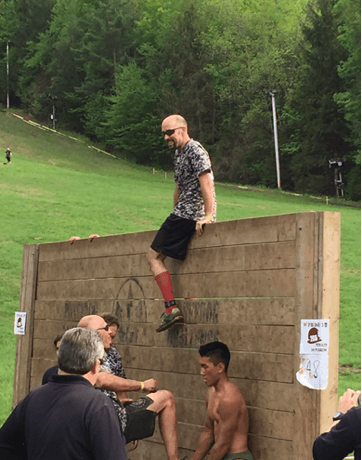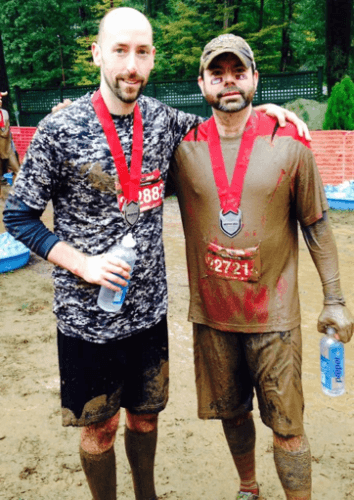Mark's Note: I thought “OCR” meant Optical Character Reader and I thought a “BattleFrog” was the name of a minor league baseball team. But that's why I have guest bloggers… to bring in different perspectives. Today's post, another from Paul Critchley, does just that.
One of my passions (aside from helping folks along their Lean journeys!) is running in obstacle course races (OCRs). On any given weekend in the summer or fall here in New England, I'll be out in a field or the woods somewhere crawling under barbed wire, running through mud or climbing over a wall. OCR has grown amazingly in just the past few years.
When I started racing five years ago, races were sparsely attended by only a core group of enthusiasts. Since then, the sport has exploded, with appearances on “Shark Tank” and having races broadcast on NBC and ESPN. As such, lots more people take part in the sport I have loved… a love that was tested last weekend.
 I was running the Spartan Super (8.1 miles long, 26 obstacles) in Barre, MA. As a “mid-to-upper” level race, this Super had a twist we'd never dealt with before: the weather.
I was running the Spartan Super (8.1 miles long, 26 obstacles) in Barre, MA. As a “mid-to-upper” level race, this Super had a twist we'd never dealt with before: the weather.
As I prepared for the race with Keith (those of you who have read my book The Whole Professional recognize who Keith is), we talked strategy, pace, and which beer we'd try first once we crossed the finish line.
We had a 10:45 start time (waves go off every 15 minutes), and as we lined up, weather conditions weren't exactly ideal for racing. At a sunny 84 degrees F and 70% humidity, just standing at the start line meant you were sweating profusely. But, OCR racers aren't known as a weak bunch, so we ventured out.
45 minutes, 6 obstacles, and 2.5 miles later, I knew something was wrong.
I was dragging.
I failed on the rope climb, an obstacle I normally have no problem with. The next obstacle – the sandbag carry – is likewise not something that slows me down much. However, hoisting the 50-pound bag onto my shoulder and starting down the hill, I could tell there wasn't much left in the tank.
I made it to the drop location, expelled my added burden, and tapped out.
Keith, who would normally push me to keep going and not let me give up, could tell I wasn't my normal self. My face was beet red, and I'd already drained more than half of my Camelbak's liquid cargo in an effort to stay hydrated. We still had a long way to go, and the hottest part of the day hadn't even arrived yet. Sullenly, we parted ways. Keith soldiered on, and I walk-of-shamed my way back to the spectator area.
Back at the finish, as I waited for Keith to cross, I did what many folks do when they are unsuccessful at something – I rationalized the failure. My thoughts ran quickly.
“It was awfully hot – much hotter than any other day we'd done an OCR.”
“At least I didn't wind up in the medical tent like the dozen or so other folks I saw there.”
“I've never failed an OCR before – it was the heat that beat me, not the course.”
All were legitimate considerations, but they were conjured by my brain merely as explanations why I couldn't do what I'd set out to do. I'd failed, and there was no denying it.
But does this one failure mean that I'll give up on OCR? Of course not.
 This whole scenario, of course, reminded me of Lean… the protests and negativity that I hear sometimes.
This whole scenario, of course, reminded me of Lean… the protests and negativity that I hear sometimes.
Once, a business owner who knew almost nothing about Lean argued with me at length about all the reasons Lean wouldn't work in his shop. They were too small; their product mix too complex… on and on he defended his position. Finally, it came to light that they'd made an attempt, once before, to begin their Lean journey and it had been a massive failure, costing the company money and nearly losing some customers. As a result, they convinced themselves that Lean had failed, not their effort toward it. So they gave up, and have never tried again.
Lean, like OCR, takes commitment. You have to train. You have to understand what you're getting into and prepare for it. You aren't going to walk into the office one day and simply “become Lean” just like you can't get off your couch and run an OCR. You also have to be willing to deal with failure, because you absolutely will fail at some point. That doesn't mean that you should give up – it just means that at that point, under those circumstances, it didn't work out. You have to adapt and overcome. The “A” part of PDCA is “Adjust” for that very reason. Review what happened, make adjustments, and try again.
One failure should not derail your Lean journey any more than one DNF is going to stop me from getting ready for my next OCR in a few weeks.
Lean is hard. The industry speculates that somewhere between 80-90% of Lean transformations eventually fail. Resolve to be a part of the 10-20%. Don't give up just because you encounter a setback – that's part of the process. Learn from what went wrong, make adjustments and go for it again. The reward is too great to abandon your Lean race.
What do you think? Please scroll down (or click) to post a comment. Or please share the post with your thoughts on LinkedIn – and follow me or connect with me there.
Did you like this post? Make sure you don't miss a post or podcast — Subscribe to get notified about posts via email daily or weekly.
Check out my latest book, The Mistakes That Make Us: Cultivating a Culture of Learning and Innovation:










Hey, I ran the same race, 8:15 competitive heat on Saturday. I saw other folks talking about the heat. I guess growing up in the south the temperature & humidity were not that bad. I thought Blue Mountain was much worse, a race I did not fuel correctly for and paid for like you. I did press through to the end.
I love OCR & Spartans in particular because they challenge you in so many ways. Physically, mentally and like you allude to creating a winning strategy. They force you to set goals and get well outside your comfort zones. You find you can accomplish much more than you ever thought. This only matriculates into the other areas of your life, such as family, faith and business.
I hope your next experience is better. To me it sounds like you might have had a bug, or like me in Palmerton had not properly eaten in the week leading to the race. Again, parallels to regular life.
Keep at it. Maybe we will cross paths at another Spartan, like Fenway this November.
Chris Love – The Normal Fat Guy :)
Hi Chris!
Glad you liked the post! I grew up in Maine, so humidity is kind of my kryptonite :)
I’ve had heat exhaustion before ((even passed out once), so I could feel where it was heading. I didn’t want to be a 160 pound sack of potatoes out in the woods somewhere that my teammates had to worry about, so I reluctantly gave in. I hate it, but it was the right call for the team.
If you get a chance, check out Bonefrog at Berkshire East. We run every year, and posted a team best time this year, taking 1:15 off last years’ time! We aren’t elites, but we train for them.
I hope our paths cross soon!